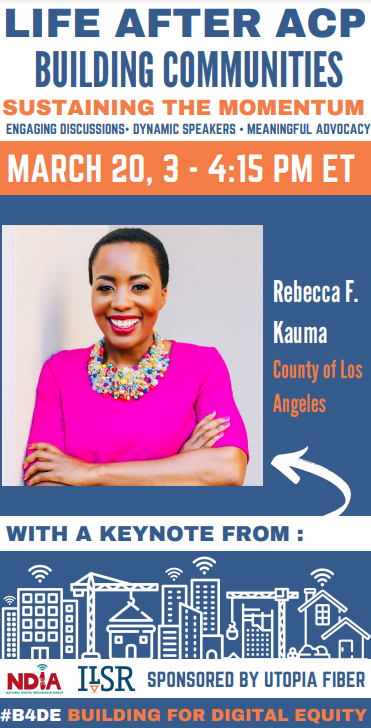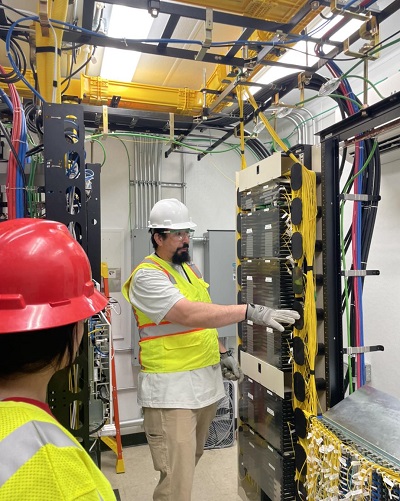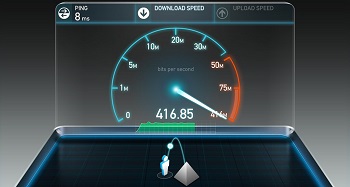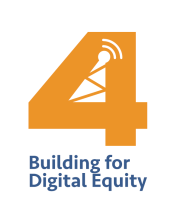
Fast, affordable Internet access for all.

If you missed our most recent Building for Digital Equity Livestream – Life After ACP – the virtual event can still be seen in its entirety (below).
The entire event focused on the imminent end of the Affordable Connectivity Program (ACP) and featured a lineup of speakers who shared on-the-ground perspectives and approaches being adopted at the community level to deal with the broadband affordability crisis in the absence of the popular federal program that has served 23 million Americans since its inception two years ago.
As a bonus, we are sharing links to the speakers slide decks below.
The first of two lightning round speakers, Margaret Käufer – President of The STEM Alliance – gave an overview on the short and long-term work her organization is doing in upstate New York in the face of ACP’s demise. You can find her slide deck here.
The second lightning round presenter Jason Inofuentes – Program Manager for the Broadband Accessibility and Affordability Office in Albemarle County, VA – unveiled an ACP supplement program his office is pursuing and how they see things moving forward. Those slides are here.
The first of the main presenters – Monica Gonzales, Digital Equity Supervisor for Methodist Healthcare Ministries in Texas – gave an overview of what her faith-based nonprofit healthcare organization is doing to address affordable connectivity across the 74 county South Texas region served by MHM. Gonzales’ slides are here.
In a recently published piece in The American Prospect, Sean Gonsalves, ILSR's Community Broadband Networks Initiative Associate Director for Communications, reports on four cities across the U.S. that are well prepared to deal with the demise of the Affordable Connectivity Program (ACP).
The article – titled "The Municipal Broadband Solution" – begins by laying out why Congress created the popular program and how letting the ACP go bankrupt undermines the national "Internet For All" Initiative now underway. However, while digital equity advocates across the nation rightly lament the demise of the program, the focus of the article is on cities that have figured out how to deliver afforable high-quality Internet access even without the ACP.
Here's a few excerpts:
Congress created the ACP to soften a harsh reality: Americans pay among the highest prices for broadband of any developed nation in the world, leaving tens of millions unable to afford internet service—something experts have long noted is a telltale sign of a broken market dominated by monopoly providers, and is at the very heart of why the U.S. digital divide is as massive as it is.
However, although federal lawmakers have known for over a year that the fund would be bankrupt by this spring, GOP congressional leaders have not budged on even bipartisan attempts to save the ACP, prompting the Federal Communications Commission (FCC) to announce in January that the agency was being forced to wind down the popular program.
It’s a major setback for the “Internet for All” effort, especially in light of a recent FCC survey that found 29 percent of ACP beneficiaries would be left without any home internet service whatsoever without the benefit, in an age when internet connectivity is a necessity for meaningful participation in 21st-century society.
Today, the first Building for Digital Equity livestream of the year will begin at 3 PM ET. The entire event will zoom in on the imminent end of the Affordable Connectivity Program (ACP) with the lineup of speakers sharing on-the-ground perspectives and approaches being adopted at the community level as they work to keep financially-strapped households connected beyond ACP.
Last minute registration are still being accepted to fill up the last few seats for the virtual gathering here.

Here’s the run-of-show:
NDIA’s Amy Huffman will set the table on where things stand with the ACP wind down process before two lightning rounds take center screen.
For the first lightning round Margaret Käufer, President of The STEM Alliance, will give an overview on the short and long-term community work her organization is doing in upstate New York in the face of ACP’s demise. That will be followed by Jason Inofuentes, Program Manager for the Broadband Accessibility and Affordability Office in Albemarle County, VA, who will spotlight an ACP supplement program his office is pursuing and how they see things moving forward.
Bringing together a nationwide cross-section of leading digital inclusion practitioners, the first Building For Digital Equity (#B4DE) livestream of the year is set to zoom in on the imminent end of the Affordable Connectivity Program (ACP).
Co-hosted by the ILSR's Community Broadband Networks Initiative and the National Digital Inclusion Alliance (NDIA), the popular (and free) virtual gathering will focus on “Life After ACP” – as the FCC continues to wind down the program with the $14.2 billion fund on track to run out of money by the end of April.
Set for March 20, 2024 from 3 to 4:15 PM ET, the lineup of speakers will share on-the-ground perspectives and approaches being adopted at the community level as they work to keep financially-strapped households connected beyond ACP.
While virtual seats for #B4DE fills up fast, registration is still open here.
Here’s the run-of-show:
NDIA’s Amy Huffman will set the table on where things stand with the ACP wind down process before two lightning rounds take center screen.
Fort Worth, Texas, (est pop. 956,000) has struck a $7.5 million, 34-year contract with Dallas-based Sprocket Networks to construct a new 300-mile fiber optic backbone to shore up city municipal communications needs, expand affordable access to marginalized neighborhoods, and boost local economic development.
City officials say construction crews are expected to begin work sometime in the next three to six months, with the full network construction expected to cost $65 million and take three years to complete.
Services will first be made available to nine target neighborhoods (including Las Vegas Trail, Como, Marine Creek, Stop Six, Rosemont and Ash Crescent) on a rolling basis. Sprocket Networks will own the finished fiber network.
“This partnership was entered into with Sprocket with the hopes of eventually getting to universal service in Fort Worth,” Fort Worth IT Solutions director Kevin Gunn told ILSR in a phone interview. “We want the gold standard fiber optic connectivity: 100 megabits symmetric and up available at every doorstep, whether that's a senior family, multifamily or commercial.”
Gunn told ILSR that the city’s initial payment of $7.5 million to Sprocket consists of $4.5 million in American Rescue Plan Act (ARPA) funds, and $3 million from the North Central Texas Council Of Governments, which has allocated some of its transportation budget to broadband improvements the agency will benefit from.
In response to COVID era broadband inequities, the city of Fort Worth last year expanded free Wi-Fi access to 40,000 largely underserved city residents. Gunn indicated that those connections will be slowly phased out as the city transitions to fiber.
From Colorado to Texas, municipal broadband providers continue to rack up industry accolades, not just for delivering fiber service–the gold standard of Internet connectivity–but for these networks’ ability to provide ubiquitous access across an entire community at affordable rates.
The National Association of Telecommunications Officers and Advisors (NATOA) recently announced that its Community Broadband Projects of the Year Awards for 2023 will go to the Connexion network in Fort Collins, Colorado and TeamPharr.net in Pharr, Texas.
Awarding Community-Wide Access and Affordability
The Fort Collins award is in recognition for the city having established “a municipal broadband utility created by and for the community to improve the life of all 80,000 residential and commercial properties of Fort Collins through better, more affordable Internet,” NATOA said in announcing the award.

But it wasn’t just because Fort Collins’ network provides city-wide access to fiber. The award also recognizes that “Connexion offers the fastest Internet speeds available at affordable prices (emphasis added) as well as competitive phone and TV services.”
In this week’s round-up of broadband news, we culled three stories we think are worth reading.
How Much is Fast Enough?
The first is a story from Ars Technica – FCC chair: Speed standard of 25Mbps down, 3Mbps up isn’t good enough anymore – written by veteran IT reporter Jon Brodkin.
For years now, broadband-for-all advocates have lamented the FCC’s minimum broadband speed standard of 25 Megabits per second (Mbps) download and 3 Mbps upload as being laughably antiquated. Indeed, it’s been almost three years since we made the case for Why 25/3 Broadband Is Not Sufficient, though it was outdated long before then.

But as Brodkin reported this week, the FCC’s minimum speed standard “could finally change under Chairwoman Jessica Rosenworcel, who is proposing a fixed broadband standard of 100Mbps downloads and 20Mbps uploads along with a goal of bringing affordable service at those speeds to all Americans.”
Under Rosenworcel’s plan, the FCC would look at availability, speeds, and prices to determine whether the agency should take regulatory actions under Section 706 of the Telecommunications Act, which requires the FCC to determine if high-speed Internet access is being deployed "on a reasonable and timely basis" to all Americans.
Officials in the South Texas town of Harlingen say they’ve put their plan to deploy a municipal broadband network on hold after projected costs ballooned well beyond original estimates.
Originally, Harlingen officials had hoped to construct a $4 million fiber network to shore up broadband access to the city’s unserved and under-served populace, using a portion of the city’s $22 million share of the American Rescue Plan Act (ARPA).
But a $100,000 study conducted by Houston-based consultants Cobb Fendley and Associates suggested a more realistic price tag would be closer to $10 million, forcing city officials to reconsider their plan.
"We were hoping to get it rolling but we ran into a few hurdles along the way," City Commissioner Ford Kinsley recently told GovTech. "We're looking for some sources other than what we originally thought."
A 2019 census survey found that nearly 35 percent of Harlingen’s households (7,887 of 22,901) lacked any broadband access whatsoever, positioning the city as second worst in the state behind Pharr, Texas, which recently built a municipal fiber network to bring affordable connectivity to its city residents. Harlingen school district officials also say they found that 900 students' homes lacked Internet access as of 2020, hampering city education standards.
The majority of the rest of the city’s residents are served by one or two providers, resulting in spotty access, high prices, and sluggish speeds. As with so many U.S. markets, the Covid home education and telecommuting boom drove home the need for the kind of affordable, uniform broadband access regional monopolies long failed to deliver.

Jessica Strom, Digital Inclusion Manager for Opportunity Home - the Public Housing Authority of San Antonio, shares the challenges of digital inclusion on their many properties as well as leaving us with exciting success stories of how people landed well-paying jobs after completing their courses. We also discuss the challenges for housing residents to avoid scams and the importance of free Wi-Fi to be ready if ACP runs out.
This show is 18 minutes long and can be played on this page or using the podcast app of your choice with this feed.
Transcript below.
We want your feedback and suggestions for the show-please e-mail us or leave a comment below.
Listen to other episodes here or see other podcasts from the Institute for Local Self-Reliance here.
Thanks to Joseph McDade for the music. The song is On the Verge and is used per his Free-Use terms.

This week on the podcast, Christopher is joined by Outreach Team Lead DeAnne Cuellar and John Speirs, Harris County, Texas' (pop. 4.7 million) Broadband Manager. Its county seat, Houston, is home to one of the largest ports in the world, and citizens and elected officials are working on projects to boost the region's economic development, climate resiliency, and connectivity to set a solid foundation for the next generation of citizens.
Christopher, DeAnne, and John talk about what's needed to close the connectivity gap for the 180k households that don't have access to basic broadband speeds, and what will happen if the state doesn't make its legislative landscape friendly enough to get the most bang for the BEAD dollars that will begin to arrive this summer.
This show is 30 minutes long and can be played on this page or via Apple Podcasts or the tool of your choice using this feed.
Transcript below.
We want your feedback and suggestions for the show-please e-mail us or leave a comment below.
Listen to other episodes here or view all episodes in our index. See other podcasts from the Institute for Local Self-Reliance here.
Thanks to Arne Huseby for the music. The song is Warm Duck Shuffle and is licensed under a Creative Commons Attribution (3.0) license.